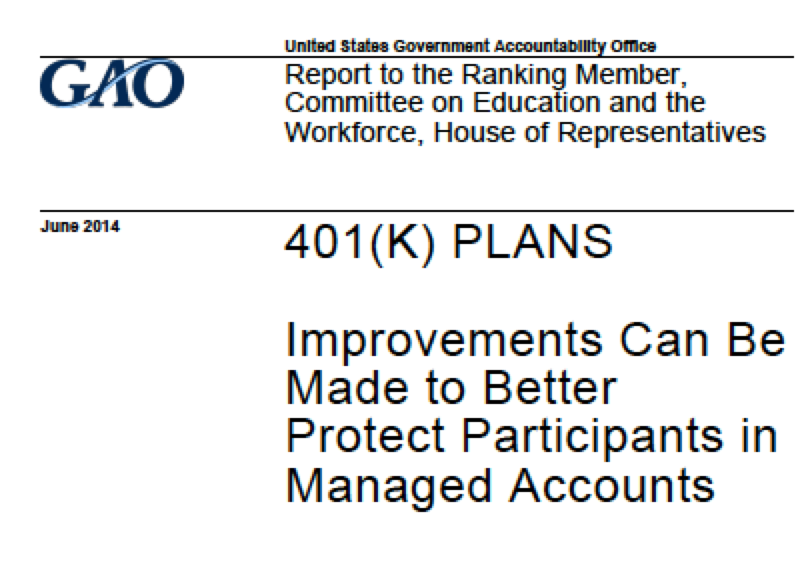Lower Costs or Hidden Problems The Legal Concerns for ETFs in 401k Plans
Post on: 23 Июль, 2015 No Comment

Investment in Exchange Traded Funds (ETFs) is growing, to the tune of nearly $250 billion, but we have not seen corresponding growth in 401k plans. This is in part because mutual funds dominate the 401k business, but also because ETFs as an investment option are misunderstood as to their risk and reward for 401k plan sponsors and plan investors. However, there are many legal issues to consider when offering ETFs in a 401k plan or offering ETFs as part of your 401k platform.
The Fiduciary Duty Myth
One of the first arguments that is generally brought up against ETFs in 401k plans is a concern based on fiduciary duty. Offering ETFs should not raise any issue with fiduciary duties more so than any other investment option. The fiduciary duties owed to plan participants from plan sponsors and other fiduciaries are based in the Employee Retirement Income Security Act of 1974 (ERISA).
Among others, these duties require fiduciaries to act in a prudent manner for the exclusive benefit of plan participants. There is much debate on what defines prudent action, but generally fiduciaries who act in a reasoned and considered manner, with the help of experts whom the fiduciaries periodically monitor, will have acted prudently. Anyone choosing to offer ETFs should evaluate ETFs as they would any other investment option: the investment returns should be considered, the expenses should be weighed, the security and risk of the investment should be evaluated and a determination should be made why offering such investment is in the best interest of plan participants. If these actions are taken, it is unlikely that having ETFs in a 401k plan or by offering ETFs as part of a 401k platform will expose a fiduciary to any more risk than is offered with mutual funds simply because ETFs are new to the 401k marketplace, provided that offering the ETF does not violate other ERISA or Internal Revenue Code (IRC) Provisions.
Offering ETFs in Your 401k Plan
The biggest benefit to an ETF in a 401k plan is their generally low expenses compared to mutual fund or insurance based offerings. However to realize this low expense, the platform and plan must overcome the biggest weakness, which is that few providers have determined how to administer ETFs as part of their retirement offerings for plan sponsors and their plan participants to enjoy these advantages. The primary challenge in offering ETFs in a 401k plan is determining how to reduce brokerage costs and trading commissions related to the purchase and sale of ETFs without violating any ERISA or IRC provisions.
ETFs trade in a manner closer to stocks than to mutual funds. Most 401k platforms are based on the premise of mutual fund trading and daily valuation. Because ETFs are traded closer to stocks they generate commissions when traded and have potentially higher valuation swings during any given time. A 401k plan and its platform must determine how to reduce these commissions to make the low expense ratio become a benefit to participants and not be offset by trading costs, while being able to administer the plan on a system built for mutual funds.
To ensure the lower expenses, a platform must ensure large trading volume and batch processing of trading orders, allowing each participant to be charged only a fraction of the trading commission cost. Some of the considerations will be:
- When is the Trading Cut-Off?
- What is the Value at that Time?
- How are commissions allocated?
- How do I know what share of the commission my trade will include?
The Future of ETFs in 401k Plans
While I do not believe that 401k Plans will be rushing to welcome ETFs, I do believe more providers will begin to offer ETFs as an option in retirement plans. Plan sponsors must be aware of the benefits of ETFs and wary of the potential problems they can create if not administered pursuant to the plan document. Providers should consider ETFs as a potential offering and understanding the legal risks and concerns with advising clients to consider adding ETFs as an investment option in a system dominated by mutual funds.
�Bullivant Houser Bailey PC June 3, 2005
###
401khelpcenter.com is not affiliated with the author of this article nor responsible for its content. The opinions expressed here are those of the author and do not necessarily reflect the positions of 401khelpcenter.com.














